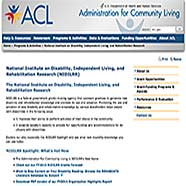KT at NIDILRR
NIDILRR is a federal government grants-making agency that sponsors grantees to generate new disability and rehabilitation knowledge and promote its use and adoption. Promoting the use and adoption of new disability and rehabilitation knowledge by various stakeholders helps people with disabilities in the following ways:
- It improves their ability to perform activities of their choice in the community
- It expands society's capacity to provide full opportunities and accommodations for its citizens with disabilities
"American Institutes for Research used in compliance with public domain status of U. S. Government publication."
Long Range Plan
The National Institute on Disability and Rehabilitation Research (NIDILRR) is requesting comments on its draft long-range plan for the period 2018-2023. NIDILRR is a component of the Administration for Community Living in the Department of Health and Human Services. Its aim is to enhance the ability of people with disabilities to achieve their maximum desired participation in the community through research and development in areas of health and function, employment, and community living and participation. This long-range plan provides an overview of the state of people with disabilities in the United States, NIDILRR’s current research investments, and potential future directions. We are publishing this plan to obtain public comment on the proposed research and development activities to help the agency fulfill its mission. Comments will be accepted by email at NIDILRRfuture@acl.hhs.gov.
- ADA Network KT Center
The ADA Knowledge Translation Center (ADAKTC) functions as a platform for knowledge translation on topics related to the ADA. It does this by working to accomplish the following three goals:- Optimize efficiency and impact of the ADA National Network's (ADANN) activities,
- Increase awareness and use of ADA research findings to inform behavior, practices, or policies, and
- Improve understanding of ADA stakeholders' need for and receipt of ADA Network Services.
- Center on Knowledge Translation for Technology Transfer (KT4TT)
The role of the KT4TT program is to assist NIDILRR Agency grantees who are conducting technology-oriented R&D projects (Technology Grantees) to achieve three primary outcomes:- Increase R&D stakeholders’ understanding of technology transfer processes and practices that lead to successful commercialization.
- Increase grantees’ capacity to plan and engage in technology transfer activities.
- Increase grantees’ rate of success in the transfer of rehabilitation technology products to the marketplace, into standards/guidelines or other intended applications.
- Model Systems KT Center (MSKTC)
The Model Systems Knowledge Translation Center (MSKTC) summarizes research, identifies health information needs, and develops information resources to support the Model Systems programs in meeting the needs of individuals with traumatic brain injury (TBI), spinal cord injury (SCI), and burn injury. - American Institutes for Research (AIR) Center on Knowledge Translation for Employment Research (KTER)
The KTER Center identifies National Institute on Disability, Independent Living, and Rehabilitation Research (NIDILRR)-funded and others' research findings that improve the lives of individuals with disabilities. Armed with this critical research, the Center determines what informational needs are most pressing for stakeholders such as individuals with disabilities and their families, vocational rehabilitation practitioners, the business community, and policy makers. - American Institutes for Research (AIR) Center on Knowledge Translation for Disability and Rehabilitation Research (KTDRR)
The Center on Knowledge Translation for Disability and Rehabilitation Research (KTDRR) makes it easier to find, understand, and use the results of research that can make a positive impact on the lives of people with disabilities. Knowledge translation (KT) refers to strategies that move research into practice by improving the relevance, reporting, accessibility, interpretation, and application of research results. The KTDRR Center focuses on KT activities to support researchers in the disability and rehabilitation field.
- Rehab data developed by NARIC
REHABDATA, produced by the National Rehabilitation Information Center, is the leading literature database on disability and rehabilitation. The database describes over 80,000 documents covering physical, mental, and psychiatric disabilities, independent living, vocational rehabilitation, special education, assistive technology, law, employment, and other issues as they relate to people with disabilities.
Review of Disability and Rehabilitation Research:
NIDILRR Grantmaking Processes and Products (2012)
The National Academies Press
Report by the National Research Council is an external evaluation of some of NIDILRR’s key processes and assessment of the quality of outputs produced by NIDILRR grantees.

